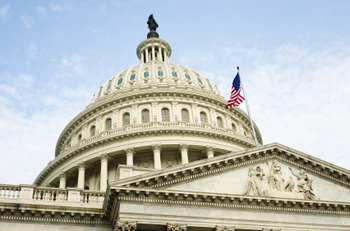
As House members return from vacation, they face a series of regulatory reform bills.
In our new series on Regulatory Reform in the 112th Congress, today we focus on bills introduced in the House of Representatives.
Unless noted otherwise, we use the term “significant regulation” throughout our review to refer to any rule that would have an anticipated effect on the economy of at least $100 million annually, that would interfere with other agency actions, or that raises a novel legal or policy issue. Also, unless noted otherwise, each bill is currently still in committee.
H.R. 2898 – Regulatory Moratorium and Jobs Preservation Act.
Introduced by Rep. Reid Ribble (R – WI)
Rep. Ribble’s Regulatory Moratorium Act would prevent agencies from adopting a significant regulation until the Bureau of Labor Statistics reports a monthly unemployment average of 7.7 percent or less. However, the President would be able to waive this ban by notifying Congress that a rule is necessary for national security or an emergency. The bill provides a private right of action for those aggrieved by a violation of it, and it also permits “substantially prevailing small businesses” to recoup reasonable attorney costs.
H.R. 3068 – Regulatory Sunset and Review Act
Introduced by Rep. Randy Hultgren (R – IL)
Rep. Hultgren’s bill would require agencies to review, modify, or terminate all current significant regulations with an annual economic impact of at least $100 million. The bill would permit Congress and agencies to initiate the review process. In addition, any person adversely affected by a non-significant regulation could petition the agency having jurisdiction over that rule and designate the rule for sunset review. Private petitioners would be entitled to a response within 90 days, and petitions would be deemed granted if a court found there was a substantial and inexcusable delay beyond that 90-day period
H.R. 3137 – Small Business Freedom of Commerce Act
Introduced by Rep. Scott Garrett (D – NJ)
Rep. Garrett’s bill would grant small businesses the ability to exempt themselves from the majority of federal regulations issued since January 20, 2009. A small business would have to notify the applicable agency of its decision to exempt itself, which would become effective thirty days after notification. However, small businesses would be prohibited from opting out of national security regulations issued by the Department of Defense or the Department of Homeland Security.
H.R. 3181 – Stop the Regulation Invasion Please Act
Introduced by Rep. Don Young (R – AK)
The STRIP Act would prohibit all federal agencies from taking any rulemaking action for at least two years and would repeal all rules that became effective after October 1, 1991; however, it permits the Administrator of the Office of Information and Regulatory Affairs (OIRA) to request waivers for rulemaking actions necessary for the enforcement of criminal laws, the enforcement of statutory rights against discrimination, or the prevention of an imminent threat to health or safety. The STRIP Act requires agencies to appoint a “Regulatory Review Officer” who can testify in a waiver hearing as to why the rule should be maintained under these exemptions. Section 6(4)(B) of STRIP contains other exceptions permitting rulemaking actions related to IRS laws, military affairs, and the regulation of banks, credit unions, or Fannie Mae and Freddie Mac.
H.R. 3194 – Job Creation and Regulatory Freeze Act
Introduced by Rep. Tim Griffin (R – AR)
Rep. Griffin’s bill would establish a moratorium on “significant regulations” until January 20, 2013, providing for exemptions similar to those provided by the STRIP Act. Rep. Griffin broadly defines significant regulation as any regulation that “directly or indirectly increases costs on businesses in a manner which will have an adverse effect on job creation, job retention, productivity, competitiveness, or the efficient functioning of the economy.” Significant regulations that “foster” private sector job creation, enhance the “competitiveness” of workers in the United States,” or reduce regulatory “burdens” are also exempted from the moratorium.
H.R. 3257 – Regulatory Time-Out Act
Introduced by Rep. Richard Hanna (R – NY)
The Regulatory Time-Out Act of 2011 provides that significant regulations will be treated as if they had not gone into effect for the period beginning with enactment and ending on January 21, 2013, and prohibits new significant regulations from being promulgated during that time period. The bill provides for similar exemptions as the STRIP Act.



